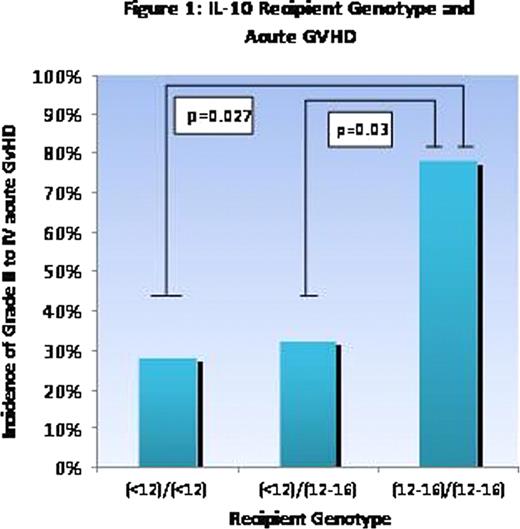Abstract
Abstract 4533
Acute graft-versus-host disease (GVHD) remains the major complication of allogeneic hematopoietic-cell transplantation (HCT). Matching of donor and recipient for human leukocyte antigens (HLA) and minor histocompatibility antigens is important to optimize the outcome of allogeneic HCT. In addition donor and recipient polymorphisms in cytokine genes can influence immune responses, inflammation, and tissue injury and have been associated with the incidence and severity of GVHD in HLA-identical bone marrow transplantation.
To gain further insights on the impact of these polymorphisms in allogeneic transplantation, we analyzed 7 polymorphisms located in four cytokine genes (interleukin-10 (IL10), interleukin-1 beta (IL1B), interleukin-1-receptor-antagonist (IL1RA) and tumor-necrosis-factor alpha (TNFa)) previously reported to have impact on outcome- in a group of 90 HLA-identical sibling donor-recipient pairs. Allele identification was realized using restriction enzyme digestion and high- resolution fragment analysis. Resulting genotypes were tested for an association with incidence and severity of GVHD by univariate and multivariate analysis.
In the donor IL-10 promoter region the IL-10.R3/R3 genotype was associated with an increased risk of grade II to IV acute GVHD in univariate and multivariate analysis (p=0.031; OR 12.33). There was no significant association between the recipients IL-10.R genotype and the incidence of acute GVHD. Previously described impact of the TNFd genotype, the IL-1B-511 and IL-10.G-1082 single nucleotide polymorphisms and the IL-1RA variable number of tandem repeat (VNTR) polymorphism could not be confirmed in this study. No significant differences were detected in the distribution of known GVHD risk factors, including age at transplantation, presence of sex mismatch between donor and recipient and use of total-body irradiation in the conditioning regimen.
Our data support previously reported results that the IL-10 promoter genotype might be useful to detect patients at risk to develop severe acute GVHD after allogeneic HCT. However, before it can improve outcome prediction over standard clinical prognostic indicators additional studies in larger HCT cohorts and prospective clinical trials are needed.
No relevant conflicts of interest to declare.
Author notes
Asterisk with author names denotes non-ASH members.


This feature is available to Subscribers Only
Sign In or Create an Account Close Modal